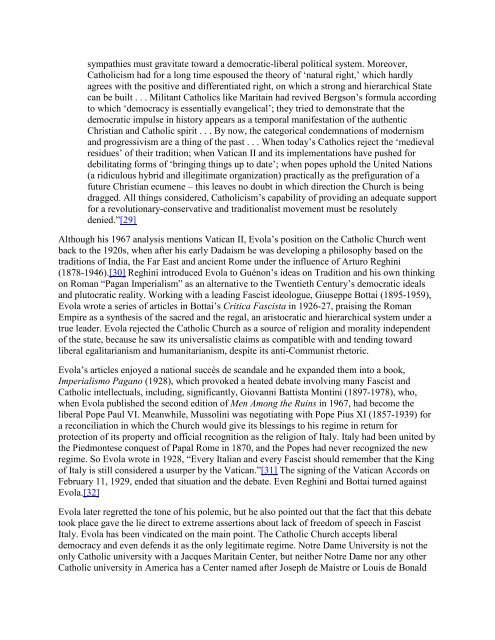Julius Evola On Tradition And The Right.pdf - WNLibrary
Julius Evola On Tradition And The Right.pdf - WNLibrary
Julius Evola On Tradition And The Right.pdf - WNLibrary
You also want an ePaper? Increase the reach of your titles
YUMPU automatically turns print PDFs into web optimized ePapers that Google loves.
sympathies must gravitate toward a democratic-liberal political system. Moreover,<br />
Catholicism had for a long time espoused the theory of ‘natural right,’ which hardly<br />
agrees with the positive and differentiated right, on which a strong and hierarchical State<br />
can be built . . . Militant Catholics like Maritain had revived Bergson’s formula according<br />
to which ‘democracy is essentially evangelical’; they tried to demonstrate that the<br />
democratic impulse in history appears as a temporal manifestation of the authentic<br />
Christian and Catholic spirit . . . By now, the categorical condemnations of modernism<br />
and progressivism are a thing of the past . . . When today’s Catholics reject the ‘medieval<br />
residues’ of their tradition; when Vatican II and its implementations have pushed for<br />
debilitating forms of ‘bringing things up to date’; when popes uphold the United Nations<br />
(a ridiculous hybrid and illegitimate organization) practically as the prefiguration of a<br />
future Christian ecumene – this leaves no doubt in which direction the Church is being<br />
dragged. All things considered, Catholicism’s capability of providing an adequate support<br />
for a revolutionary-conservative and traditionalist movement must be resolutely<br />
denied.”[29]<br />
Although his 1967 analysis mentions Vatican II, <strong>Evola</strong>’s position on the Catholic Church went<br />
back to the 1920s, when after his early Dadaism he was developing a philosophy based on the<br />
traditions of India, the Far East and ancient Rome under the influence of Arturo Reghini<br />
(1878-1946).[30] Reghini introduced <strong>Evola</strong> to Guénon’s ideas on <strong>Tradition</strong> and his own thinking<br />
on Roman “Pagan Imperialism” as an alternative to the Twentieth Century’s democratic ideals<br />
and plutocratic reality. Working with a leading Fascist ideologue, Giuseppe Bottai (1895-1959),<br />
<strong>Evola</strong> wrote a series of articles in Bottai’s Critica Fascista in 1926-27, praising the Roman<br />
Empire as a synthesis of the sacred and the regal, an aristocratic and hierarchical system under a<br />
true leader. <strong>Evola</strong> rejected the Catholic Church as a source of religion and morality independent<br />
of the state, because he saw its universalistic claims as compatible with and tending toward<br />
liberal egalitarianism and humanitarianism, despite its anti-Communist rhetoric.<br />
<strong>Evola</strong>’s articles enjoyed a national succès de scandale and he expanded them into a book,<br />
Imperialismo Pagano (1928), which provoked a heated debate involving many Fascist and<br />
Catholic intellectuals, including, significantly, Giovanni Battista Montini (1897-1978), who,<br />
when <strong>Evola</strong> published the second edition of Men Among the Ruins in 1967, had become the<br />
liberal Pope Paul VI. Meanwhile, Mussolini was negotiating with Pope Pius XI (1857-1939) for<br />
a reconciliation in which the Church would give its blessings to his regime in return for<br />
protection of its property and official recognition as the religion of Italy. Italy had been united by<br />
the Piedmontese conquest of Papal Rome in 1870, and the Popes had never recognized the new<br />
regime. So <strong>Evola</strong> wrote in 1928, “Every Italian and every Fascist should remember that the King<br />
of Italy is still considered a usurper by the Vatican.”[31] <strong>The</strong> signing of the Vatican Accords on<br />
February 11, 1929, ended that situation and the debate. Even Reghini and Bottai turned against<br />
<strong>Evola</strong>.[32]<br />
<strong>Evola</strong> later regretted the tone of his polemic, but he also pointed out that the fact that this debate<br />
took place gave the lie direct to extreme assertions about lack of freedom of speech in Fascist<br />
Italy. <strong>Evola</strong> has been vindicated on the main point. <strong>The</strong> Catholic Church accepts liberal<br />
democracy and even defends it as the only legitimate regime. Notre Dame University is not the<br />
only Catholic university with a Jacques Maritain Center, but neither Notre Dame nor any other<br />
Catholic university in America has a Center named after Joseph de Maistre or Louis de Bonald
















